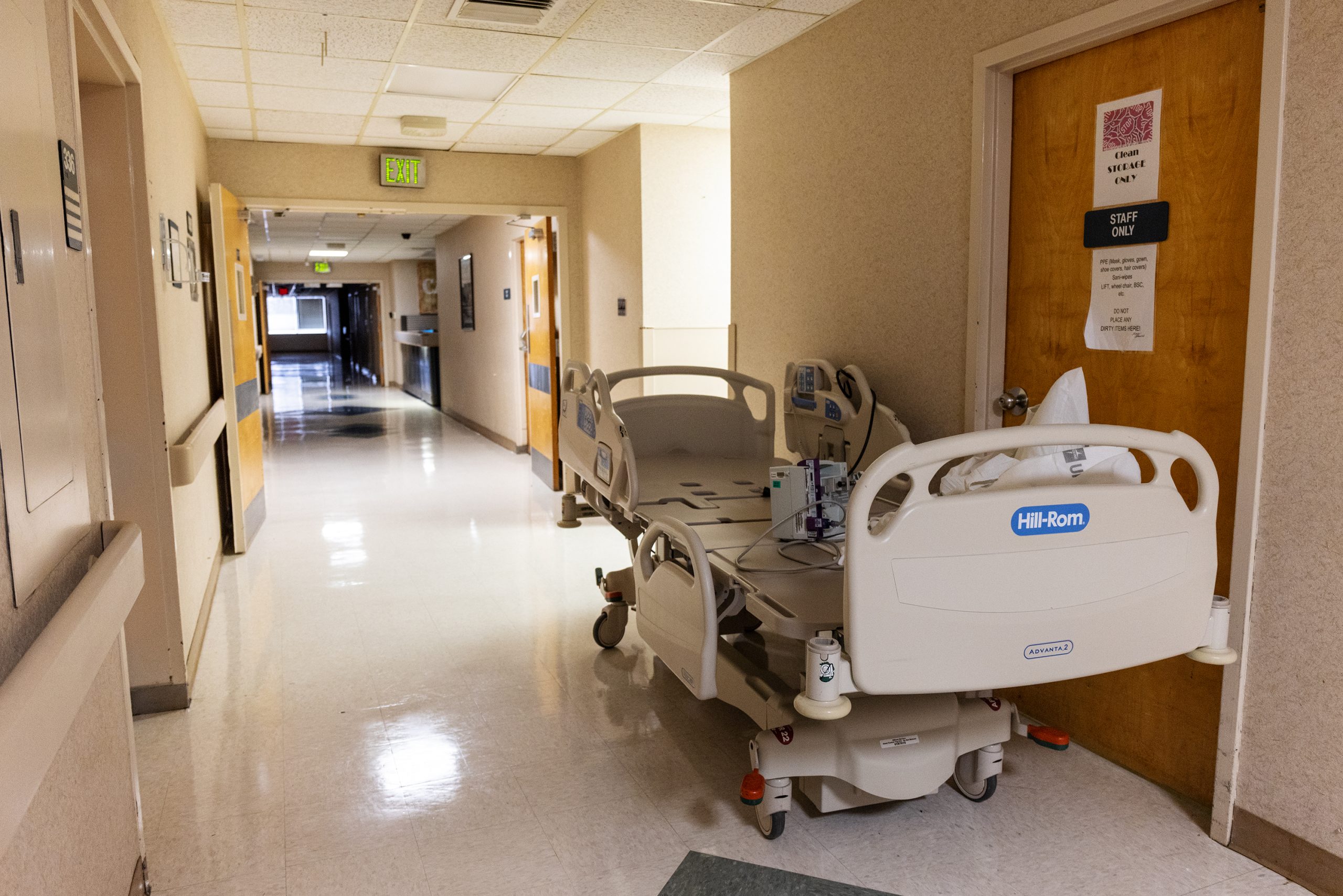Mississippi Today
In last ditch effort to stay open, Holly Springs hospital ends inpatient care
In last ditch effort to stay open, Holly Springs hospital ends inpatient care
Alliance Healthcare System in Holly Springs is Mississippi’s first rural emergency hospital – the first in a trend some say indicates the further decline of health care access in the one of the country’s poorest and sickest states.
Hospitals were able to apply for the new federal designation mere weeks ago, when the Mississippi Department of Health rolled out its rules for “rural emergency hospitals.” The federal government finalized the program in November.
Rural emergency hospitals are a step below critical access hospitals, which must have 25 or fewer inpatient beds, provide emergency services, keep its patients for less than 96 hours and be located at least 35 miles from another hospital.
The resources at rural emergency hospitals are even fewer — they must end all inpatient care and transfer patients to larger hospitals within 24 hours of the patient coming to the emergency room.
The hospital has already begun getting rid of all its inpatient beds and discharging current patients, as reported by the South Reporter, Marshall County’s community newspaper, on Wednesday. The acute care center is currently licensed for 40 beds, though its daily census doesn’t go much higher than four or five patients a day, according to hospital CEO Dr. Kenneth Williams.
The hospital has partnered with North Mississippi Medical Center and will transfer its patients there if necessary, he said.
He also said Alliance is one of just a handful of hospitals across the country approved for the designation so far.
As of Thursday, spokespeople from the state Department of Health said Alliance’s new hospital designation hadn’t been approved by the Centers for Medicare and Medicaid Services. But according to Williams, it had been approved by both required parties, CMS and the state Health Department, on Wednesday.
“I haven’t even had a chance to share this with my staff,” he said Thursday. “Yesterday was an exciting day for me to have that designation. I’m looking forward to the future to see how it works out.”
Rural emergency hospitals also can’t provide swing bed services, which means if a hospital operates a nursing home, that has to close. Alliance does not operate a nursing home.
Both rural emergency and critical access hospital designations are meant to ease financial stress — if a hospital qualifies as either, in exchange, they get paid more for their services. Rural emergency hospitals also get monthly payments from the federal government.
The program is aimed at preventing the closure of rural hospitals and creating a way they can increase financial viability and maintain operations. The idea is that rural hospitals at risk of closure already struggle with low patient counts and low payments for inpatient care.
But it’s meant as a last resort for hospitals that are barely surviving because of the limited amount of services a rural emergency hospital can offer.
State Health Officer Dr. Dan Edney considers it a closure when a hospital converts to an REH because of the loss of services. He tweeted in early February about the state’s first “loss” of a hospital, which is around the time Alliance applied for the designation with the Centers for Medicare and Medicaid Services and the Mississippi Department of Health. He compared rural emergency hospitals to triage units.
Williams, on the other hand, sees them as “expanded outpatient hospital systems.”
Rep. John Faulkner, a Democrat who represents Holly Springs, was not immediately available for comment Friday morning.
Williams bought the hospital two decades ago when he heard it was struggling. During its first years under Williams, he said the hospital was making money. Then in 2006, it lost almost $2 million with the arrival of Medicare Advantage plans, which are privatized versions of Medicare that often deny needed care and underpay hospitals.
Holly Springs is a certified retirement community, which means most of the hospital’s patients are on Medicare.
They’ve had good years and bad years since, but it’s been mostly downhill, especially since the pandemic began.
“I knew that our hospital couldn’t exist under the payment system it is under right now,” Williams said.
A little more than a decade ago, Alliance tried applying to become a critical access hospital. They were rejected because of the hospital’s proximity to Memphis.
Now, Williams says the federal rules are a little more relaxed, and he decided to apply at the recommendation of his partner, Quentin Whitwell, who operates hospitals in north Mississippi and serves as legal counsel for Alliance Healthcare, and the hospital’s financial team.
“With REH, the robust outpatient services the clinic brings to the community will be enhanced, along with continued 24/7 coverage, and the costly services will be reduced while receiving an annual subsidy,” Whitwell said when reached by text Thursday. “We are glad it worked out.”
Few Mississippi hospitals are making money, especially in the state’s more rural regions. The problem is multifaceted, but experts say the crisis has resulted from a combination of state leaders’ refusal to expand Medicaid, insurance companies’ low reimbursement rates and the pandemic forcing costs up in all areas, including staffing.
“The funding of health care in rural America is going down,” Edney previously told Mississippi Today in an interview. “There is no one coming to the rescue.”
Williams said many of the challenges hospitals are facing lead back to insurance payments and managed care plans, like Medicare Advantage.
He could’ve closed the hospital back in 2012, Williams said, when it first applied for critical access status, but he’s done everything he can to keep it open, including some layoffs and reorganizing their staff.
But at some point, “you cut muscle instead of fat,” Williams said.
One report from the Center for Healthcare Quality and Payment Reform puts a third of rural Mississippi hospitals at risk of closure, and half of those within a few years.
“Too many small rural hospitals are closing,” Williams said. “Big hospitals are struggling, whether or not they admit it, but you can get by if you’re doing high-end procedures.
“But just to take care of a regular patient who has congestive heart failure, with diabetic ketoacidosis, who is sick, they (insurance companies) don’t want to pay you for it.”
According to data from the CHQPR, Alliance Health has been losing money for the past few years, both overall and specifically taking care of patients.
And just in case the rural emergency hospital structure doesn’t work, Alliance is still applying for the critical access designation, too. If the new designation doesn’t stabilize the hospital, it can revert to its original status as an acute care facility or, if it is approved for the critical access hospital designation, it can convert to that, instead.
“Would I prefer to have us continue to operate the way that we were, having patients be admitted? Absolutely,” Williams said. “It is unfortunate that we had to make this move, but it is the right move based on the reality of health care and this payment system.”
According to Edney, Mississippi can likely expect more conversions to rural emergency hospitals – or, as he refers to them, “closures” – in the coming months.
This article first appeared on Mississippi Today and is republished here under a Creative Commons license.
Mississippi Today
Hospitals see danger in Medicaid spending cuts
Mississippi hospitals could lose up to $1 billion over the next decade under the sweeping, multitrillion-dollar tax and policy bill President Donald Trump signed into law last week, according to leaders at the Mississippi Hospital Association.
The leaders say the cuts could force some already-struggling rural hospitals to reduce services or close their doors.
The law includes the largest reduction in federal health and social safety net programs in history. It passed 218-214, with all Democrats voting against the measure and all but five Republicans voting for it.
In the short term, these cuts will make health care less accessible to poor Mississippians by making the eligibility requirements for Medicaid insurance stiffer, likely increasing people’s medical debt.
In the long run, the cuts could lead to worsening chronic health conditions such as diabetes and obesity for which Mississippi already leads the nation, and making private insurance more expensive for many people, experts say.
“We’ve got about a billion dollars that are potentially hanging in the balance over the next 10 years,” Mississippi Hospital Association President Richard Roberson said Wednesday during a panel discussion at his organization’s headquarters.
“If folks were being honest, the entire system depends on those rural hospitals,” he said.
Mississippi’s uninsured population could increase by 160,000 people as a combined result of the new law and the expiration of Biden-era enhanced subsidies that made marketplace insurance affordable – and which Trump is not expected to renew – according to KFF, a health policy research group.
That could make things even worse for those who are left on the marketplace plans.
“Younger, healthier people are going to leave the risk pool, and that’s going to mean it’s more expensive to insure the patients that remain,” said Lucy Dagneau, senior director of state and local campaigns at the American Cancer Society.
Among the biggest changes facing Medicaid-eligible patients are stiffer eligibility requirements, including proof of work. The new law requires able-bodied adults ages 19 to 64 to work, do community service or attend an educational program at least 80 hours a month to qualify for, or keep, Medicaid coverage and federal food aid.
Opponents say qualified recipients could be stripped of benefits if they lose a job or fail to complete paperwork attesting to their time commitment.
Georgia became the case study for work requirements with a program called Pathways to Coverage, which was touted as a conservative alternative to Medicaid expansion.
Ironically, the 54-year-old mechanic chosen by Georgia Gov. Brian Kemp to be the face of the program got so fed up with the work requirements he went from praising the program on television to saying “I’m done with it” after his benefits were allegedly cancelled twice due to red tape.
Roberson sent several letters to Mississippi’s congressional members in weeks leading up to the final vote on the sweeping federal legislation, sounding the alarm on what it would mean for hospitals and patients.
Among Roberson’s chief concerns is a change in the mechanism called state directed payments, which allows states to beef up Medicaid reimbursement rates – typically the lowest among insurance payors. The new law will reduce those enhanced rates to nearly as low as the Medicare rate, costing the state at least $500 million and putting rural hospitals in a bind, Roberson told Mississippi Today.
That change will happen over 10 years starting in 2028. That, in conjunction with the new law’s one-time payment program called the Rural Health Care Fund, means if the next few years look normal, it doesn’t mean Mississippi is safe, stakeholders warn.
“We’re going to have a sort of deceiving situation in Mississippi where we look a little flush with cash with the rural fund and the state directed payments in 2027 and 2028, and then all of a sudden our state directed payments start going down and that fund ends and then we’re going to start dipping,” said Leah Rupp Smith, vice president for policy and advocacy at the Mississippi Hospital Association.

Even with that buffer time, immediate changes are on the horizon for health care in Mississippi because of fear and uncertainty around ever-changing rules.
“Hospitals can’t budget when we have these one-off programs that start and stop and the rules change – and there’s a cost to administering a program like this,” Smith said.
Since hospitals are major employers – and they also provide a sense of safety for incoming businesses – their closure, especially in rural areas, affects not just patients but local economies and communities.
U.S. Rep. Bennie Thompson is the only Democrat in Mississippi’s congressional delegation. He voted against the bill, while the state’s two Republican senators and three Republican House members voted for it. Thompson said in a statement that the new law does not bode well for the Delta, one of the poorest regions in the U.S.
“For my district, this means closed hospitals, nursing homes, families struggling to afford groceries, and educational opportunities deferred,” Thompson said. “Republicans’ priorities are very simple: tax cuts for (the) wealthy and nothing for the people who make this country work.”
While still colloquially referred to as the One Big Beautiful Bill Act, the name was changed by Democrats invoking a maneuver that has been used by lawmakers in both chambers to oppose a bill on principle.
“Democrats are forcing Republicans to delete their farcical bill name,” Senate Democratic Leader Charles Schumer of New York said in a statement. “Nothing about this bill is beautiful — it’s a betrayal to American families and it’s undeserving of such a stupid name.”
The law is expected to add at least $3.3 trillion to the nation’s debt over the next 10 years, according to the most recent estimate from the Congressional Budget Office.
This article first appeared on Mississippi Today and is republished here under a Creative Commons Attribution-NoDerivatives 4.0 International License.
The post Hospitals see danger in Medicaid spending cuts appeared first on mississippitoday.org
Note: The following A.I. based commentary is not part of the original article, reproduced above, but is offered in the hopes that it will promote greater media literacy and critical thinking, by making any potential bias more visible to the reader –Staff Editor.
Political Bias Rating: Center-Left
This article reports on the negative impacts of a major federal tax and policy bill on Medicaid funding and rural hospitals in Mississippi. While it presents factual details and statements from stakeholders, the tone and framing emphasize the harmful consequences for vulnerable populations and health care access, aligning with concerns typically raised by center-left perspectives. The article highlights opposition by Democrats and critiques the bill’s priorities, particularly its effect on poor and rural communities, suggesting sympathy toward social safety net preservation. However, it maintains mostly factual reporting without overt partisan language, resulting in a moderate center-left bias.
Crooked Letter Sports Podcast
Podcast: The Mississippi Sports Hall of Fame Class of ’25
The MSHOF will induct eight new members on Aug 2. Rick Cleveland has covered them all and he and son Tyler talk about what makes them all special.
Stream all episodes here.
This article first appeared on Mississippi Today and is republished here under a Creative Commons Attribution-NoDerivatives 4.0 International License.
The post Podcast: The Mississippi Sports Hall of Fame Class of '25 appeared first on mississippitoday.org
Mississippi Today
‘You’re not going to be able to do that anymore’: Jackson police chief visits food kitchen to discuss new public sleeping, panhandling laws
Diners turned watchful eyes to the stage as Jackson Police Chief Joseph Wade took to the podium. He visited Stewpot Community Services during its daily free lunch hour Thursday to discuss new state laws, which took effect two days earlier, targeting Mississippians experiencing homelessness.
“I understand that you are going through some hard times right now. That’s why I’m here,” Wade said to the crowd. “I felt it was important to come out here and speak with you directly.”
Wade laid out the three bills that passed earlier this year: House Bill 1197, the “Safe Solicitation Act,” HB 1200, the “Real Property Owners Protection Act” and HB 1203, a bill that prohibits camping on public property.
“Sleeping and laying in public places, you’re not going to be able to do that anymore,” he said. “There’s a law that has been passed that you can’t just set up encampments on public or private properties where it’s a public nuisance, it’s a problem.”
The “Real Property Owners Protection Act,” authored by Rep. Brent Powell, R-Brandon, is a bill that expedites the process of removing squatters. The “Safe Solicitation Act,” authored by Rep. Shanda Yates, I-Jackson, requires a permit for panhandling and allows people to be charged with a misdemeanor if they violate this law. The offense is punishable by a fine not to exceed $300 and an offender could face up to six months in jail. Wade said he’s currently working with his legal department to determine the best strategy for creating and issuing permits.
“We’re going to navigate these legal challenges, get some interpretations, not only from our legal department, but the Attorney General’s office to ensure that we are doing it legally and lawfully, because I understand that these are citizens,” he said. “I understand that they deserve to be treated with respect, and I understand that we are going to do this without violating their constitutional rights.”
Wade said the Jackson Police Department is steadily fielding reports of squatters in abandoned properties and the law change gives officers new power to remove them more quickly. The added challenge? Figuring out what to do with a person’s belongings.
“These people are carrying around what they own, but we are not a repository for all of their stuff,” he said. “So, when we make that arrest, we’ve got to have a strategic plan as to what we do with their stuff.”
Wade said there needs to be a deeper conversation around the issues that lead someone to becoming homeless.
“A lot of people that we’re running across that are homeless are also suffering from medical conditions, mental health issues, and they’re also suffering from drug addiction and substance abuse. We’ve got to have a strategic approach, but we also can’t log jam our jail down in Raymond,” Wade said.
He estimates that more than 800 people are currently incarcerated at the Raymond Detention Center, and any increase could strain the system as the laws continue to be enforced.
“I think there’s layers that we have to work through, there’s hurdles that we are going to overcome, but we’ve got to make sure that we do it and make sure that my team and JPD is consistent in how we enforce these laws,” Wade said.
Diners applauded Wade after he spoke, in between bites of fried chicken, salad, corn and 4th of July-themed packaged cakes. Wade offered to answer questions, but no one asked any.
Rev. Jill Buckley, executive director of Stewpot, said that the legislation is a good tool to address issues around homelessness and community needs. She doesn’t want to see people who are homeless be criminalized, but she also wants communities to be safe.
“I support people’s right to self determine, and we can’t impose our choices on other people, but there are some cases in which that impinges on community safety, and so to the extent that anyone who is camping or panhandling or squatting and is a danger to themselves and others, of course, I fully support that kind of law. I don’t support homelessness being criminalized as such,” Buckley said.

Many of the people Wade addressed while they ate Thursday said they have housing, don’t panhandle, and shouldn’t be directly impacted by the legislation. But Marcus Willis, 42, said it would make more sense if elected officials wanted to combat the negative impacts of homelessness that they help more people secure employment.
“There ain’t enough jobs,” said Willis, who was having lunch with his girlfriend Amber Ivy.
The two live in an apartment together nearby on Capitol Street, where Ivy landed after her mother, whom Ivy had been living with, suffered a stroke and lost the property. Similarly, Willis started coming to eat at Stewpot after his grandmother, whose house he used to visit for lunch, passed away.
Willis holds odd jobs – cutting grass, home and auto repair – so the income is inconsistent, and every opportunity for stable employment he said he’s found is outside of Jackson in the suburbs. The couple doesn’t have a car.
Making rent every month usually depends on their ability to find someone to help chip in, said Ivy, who is in recovery from substance abuse. She said she’s watched problems surrounding homelessness grow over the years in Jackson. Ivy grew up near Stewpot and has lived in various neighborhoods across the city – except for the times she moved out of state when things got too rough.
“There was just moments where I just had to leave,” Ivy said. “Sometimes if you hit a slump here, there’s almost no way for you to get out of it.”
This article first appeared on Mississippi Today and is republished here under a Creative Commons Attribution-NoDerivatives 4.0 International License.
The post 'You're not going to be able to do that anymore': Jackson police chief visits food kitchen to discuss new public sleeping, panhandling laws appeared first on mississippitoday.org
Note: The following A.I. based commentary is not part of the original article, reproduced above, but is offered in the hopes that it will promote greater media literacy and critical thinking, by making any potential bias more visible to the reader –Staff Editor.
Political Bias Rating: Center-Right
This article primarily reports on new laws in Jackson, Mississippi, targeting public sleeping, panhandling, and squatting, focusing on statements by Police Chief Joseph Wade and community perspectives. The coverage presents the legislative measures—authored by Republican and independent lawmakers—with a tone that emphasizes law enforcement challenges and community safety, reflecting a conservative approach to homelessness as a public order issue. While it includes voices concerned about criminalization and the need for social support, the overall framing centers on law enforcement and property protection. The article maintains factual reporting without overt editorializing but leans slightly toward a center-right perspective by highlighting legal enforcement as a solution.
-
News from the South - Georgia News Feed7 days ago
'Big Beautiful Bill' already felt at Georgia state parks | FOX 5 News
-
The Center Square7 days ago
Alcohol limits at odds in upcoming dietary guidelines | National
-
The Center Square5 days ago
Here are the violent criminals Judge Murphy tried to block from deportation | Massachusetts
-
News from the South - Kentucky News Feed5 days ago
Woman arrested in Morgantown McDonald’s parking lot
-
News from the South - Texas News Feed6 days ago
Hill Country flooding: Here’s how to give and receive help
-
News from the South - North Carolina News Feed6 days ago
Raleigh caps Independence Day with fireworks show outside Lenovo Center
-
News from the South - Missouri News Feed7 days ago
Shannon County Sheriff alleges ‘orchestrated campaign of harassment and smear tactics,’ threats to life
-
Our Mississippi Home7 days ago
The Other Passionflower | Our Mississippi Home



















































